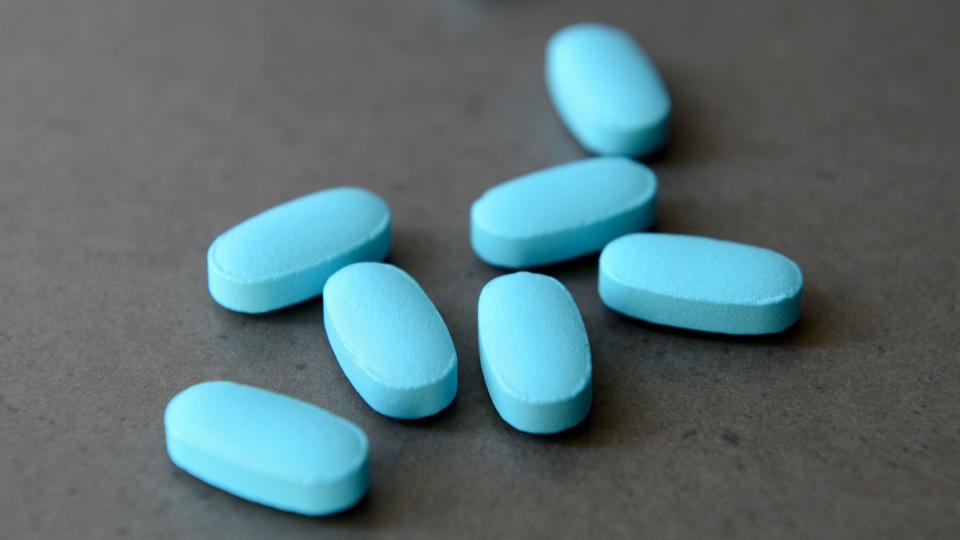Ask Stacy: Should I take Anti-Diarrheal Meds Before a Race?
This article originally appeared on Triathlete
Dear Stacy: I’ve heard some triathletes take anti-diarrheal medicines like Imodium before a race to prevent GI distress. Is this a good idea?
The short answer is “no,” especially if you will be racing in warm to hot conditions. Imodium (Loperamide) is designed to slow gut motility in resting conditions, but it should not be used in high stress, high sweat, long duration exercise; the primary mechanism of action is to slow gut motility by altering water and electrolyte movement through the bowel. The drug binds to an opiate receptor in the gut wall, and inhibits the release of chemicals responsible for intestinal muscle contraction; thus increasing intestinal transit time.
There is also an increased risk of heart rhythm disruption (QT prolongation), due to dehydration coupled with lower blood levels of magnesium and potassium. Although loperamide alters the intestinal transport of water and electrolytes by increasing absorption, it does the opposite with glucose and other nutrients from the small intestines. From a fueling standpoint, the use of loperamide has a direct effect on glucose utilization: the activation of those opioid receptors in the gut wall also increases glucose utilization in the peripheral tissues and increases liver gluconeogenesis. The long and the short of it is that by using Imodium, you are reducing absorption of nutrients from the intestines, which reduces blood glucose and the ability to regenerate glucose for fueling your race. Because loperamide reduces fluid and electrolyte movement into the intestines, (to reduce loose stools), there can be a misstep in fluid and electrolyte balance thermoregulation (sweating and blood flow) during exercise.
RELATED: The Fine Art (and Science) of Fueling for Hot Races

What to do instead of taking Imodium before your race
If you’re concerned about GI distress during your race, you can try activated charcoal or attapulgite to help reduce gut motility and absorb toxins or irritants that are in the intestines. But the best option is to control as many factors to prevent the onset of gastrointestinal problems.
First, let’s unpack what is happening to cause GI distress. The exact cause of runner’s diarrhea is not really known, but there are several common factors that can exacerbate the risk; causing a sprint to the nearest port-a-potty instead of the finish line.
The physical jostling of the organs due to the up and down motion of running.
Decreased blood flow to the intestines. When we run, our bodies divert the blood flow from the intestines to the working muscles and skin (to offload heat), which causes a disruption in normal digestion.
Increased intestinal hormone secretion. This hormonal imbalance inevitably speeds up the digestive process.
An increased amount of concentrated carbohydrates (e.g. gels, sports drinks) or introduction of a new food.
Pre-race anxiety and stress.
RELATED: Ask Stacy: How Can I Deal With GI Distress in the Heat?
You probably don’t need Imodium before your race – try these strategies to prevent GI distress
Let’s look at dietary changes to make in the week leading up to the race.
At least two days before your race, limit or avoid high-fiber and gas-producing foods, such as beans, bran, fruit, and salad.
In the three to six hours before racing, limit or avoid high-fat foods. If you are not in need of a pre-race caffeine hit, it is best to avoid it as caffeine stimulates gut motility, which can lead to loose stools or diarrhea. Avoid/limit sugar substitutes such as sorbitol and sucralose, dairy products or any foods known to cause loose stools or flatulence for several days prior to the race. You will want to check your sports nutrition products as many companies are including sorbitol, mannitol, or xylitol to increase the sweetness with a sugar reduction; these sugar alcohols are notorious for increasing gas, bloating, and loose stools when consumed in moderate amounts.
Critical to race performance is also critical to avoiding GI distress: hydrate, both in the days before your race and on race day. Since dehydration can lead to diarrhea, check your levels of hydration by aiming to produce a very light yellow urine color before you begin your race.
On race morning, be cautious of consuming energy gels and high carbohydrate sports drinks, especially if you have not trained with such products before. It is well known that these products can contribute to diarrhea by increasing the osmotic pressure in the intestines; drawing water into the intestines. Always avoid introducing a new food or supplement on race day.
Race morning nervousness and anxiety can definitely cause a neural trigger for gastrointestinal distress. By implementing mindfulness and a structured pre-race plan, the familiarity of the routine can help calm you down, reducing the risk for GI issues.
During the race, slow down if you experience GI distress. Yes, it is a race, but the goal is to get to the finish line! By slowing down, you will reduce the amount of heat your body is producing (from the working muscles) and will help redistribute some of your blood to the gut. This reperfusion will increase oxygen to the intestinal cells and help reduce the permeability of your intestinal cells. Eat something bland (crackers, pretzels) and stay away from warm fluids, gels, other concentrated liquid carbohydrate, salt tablets, and caffeine- all which have been shown to promote GI permeability and disrupt fluid balance of the gut.
If you still have concerns and issues, Imodium can be a last resort, but know that you will need to adjust your fueling and hydration plan to accommodate the changes the loperamide induces in the gut.
RELATED: How to Get Through an Ironman Without Sh*tting Yourself
For exclusive access to all of our fitness, gear, adventure, and travel stories, plus discounts on trips, events, and gear, sign up for Outside+ today.

